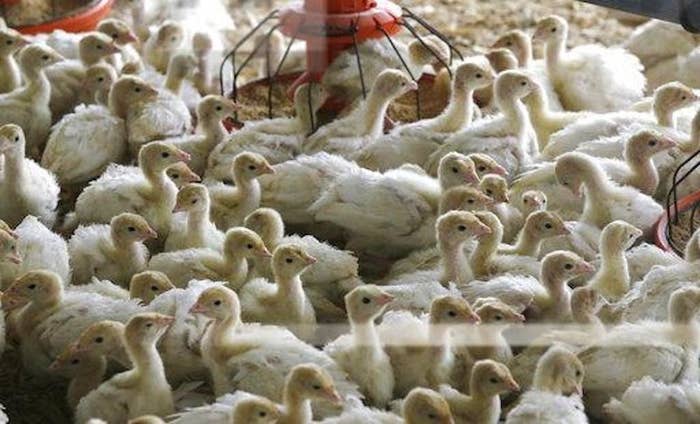
In the IFC show Portlandia, characters played by Fred Armisen and Carrie Brownstein are so concerned about the early life of the chicken they are ordering in a restaurant that they insist on going to visit the farm where the bird was raised — even after their server shows them a picture of him and says reassuringly, "His name was Colin."
Now, thanks to blockchain technology, some consumers this year are able to do virtually the same thing with the turkey they buy for Thanksgiving dinner. In a pilot program from Cargill, birds raised on certain farms are being sold with a tracking code on their package. The buyer can enter the code online to see information about the farm it came from, pictures, and even a message from the farmer who raised the turkey.
Here's the Portlandia restaurant scene about the provenance of the chicken on the menu:
View this video on YouTube
While the program, which applies to a limited number of Cargill's Honeysuckle White turkeys, is clearly an entertaining novelty for consumers, it is, more significantly, a way for the turkey company to track its birds and be able to pinpoint them in the event that food safety or other issues arise. The technology behind the program — blockchain — is the same one that underpins the digital currency bitcoin and its variants.
Food manufacturers see blockchain as an efficient way to track fruits, vegetables, and even turkeys from farm to truck to supermarket to table, ideally adding a layer of safety and accountability to the food supply chain.
"Blockchain is one of those technologies that will disrupt in a lot of ways," Deb Bauler, Cargill Protein's chief information officer, told BuzzFeed News. "There are things that are compelling about it in food: It's secure, distributed, and irrefutable; there's a lot in it that made sense to play with in the food space."
Starting in early November, Cargill, the privately held Minnesota agricultural giant, began selling blockchain-tracked turkeys in select supermarkets — primarily Albertson's, Kroger, and Walmart — in 18 states, mainly in the South and Midwest. People can go online to find out where they are sold.
Cargill Tracks Turkey On The Blockchain https://t.co/quVHkccipN
While Bauler said that blockchain technology could be used in the future by Cargill to help accelerate recalls, she said the focus now was on communicating with consumers. "We’re trying to tell our story about farmer and food you eat. This is easier than RFID tags," she said.
For Darrell Glaser, a contract farmer for Cargill who has been raising turkeys since 1994 outside Rogers, Texas, the blockchain project is a way to show consumers who buy Honeysuckle Whites just what he does.
"We’ve always tried to be involved with consumers in our farming operation," Glaser told BuzzFeed News. "There’s a disconnect between where products are produced and the consumer."
Glaser said he hoped the Cargill project would "add confidence to the consumer" and let people see "where their birds are coming from, and get them a little more knowledge about how we do things and why."
Turkey farmer Darrell Glaser buys his Thanksgiving bird at the local grocery store, just like most folks. https://t.co/5nUlCkKWlu
Cargill is in good company. In August, IBM announced that it was introducing a blockchain project along with major food companies like Dole, Walmart, Tyson, Nestlé, and Kroger to address food safety issues, ideally to be able to pinpoint the source of any bad food that makes it into the marketplace.
"It's a bit of a big-data problem," Brigid McDermott, IBM's vice president of blockchain business development, told BuzzFeed News. "You want a complete view of all the foods that are out there."
A grocery chain like Kroger, for example, would want a view of all its suppliers when trying to locate the source of some bad chicken or lettuce. "You want a system that can look across different suppliers and retailers and so you can triangulate exactly the source of the food," McDermott said.
A more comprehensive view of the total supply chain might allow for more targeted responses when food-related illnesses or contaminations are discovered, McDermott said. "Nobody wants a recall where you say, 'Don’t eat any hummus,' and nobody eats hummus for six months after. It would be much better if a retailer called you on the phone and said, 'You bought bad hummus.'"
IBM points to the 400,000 people a year who are killed by food-borne illnesses and to the billions of dollars that can be lost when companies initiate broad recalls — which is particularly irksome when only one producer is shipping out bad food.
"There’s a cost to the business of doing recalls of foods that are perfectly fine, but you don’t know until it’s too late," McDermott said. "Something like that can decimate an entire industry."
While the project is still in development, IBM has done some work on a very specific product: mangoes.
As part of a test, McDermott said, a Walmart food safety executive asked his employees to figure out where a package of sliced mangoes came from. It took them almost seven days to identify the supplier, because they didn't immediately know all the steps that the mangoes took to get to the store, such as where they were processed or put into cold storage.
By contrast, using IBM's blockchain technology, McDermott said, they were able to figure out the path the mangoes took to the store in 2.2 seconds.
"The food traceability issue is a big problem that we thought blockchain was particularly well suited to," McDermott said.

